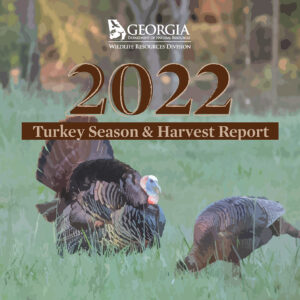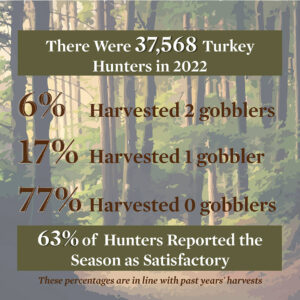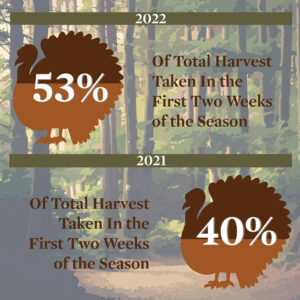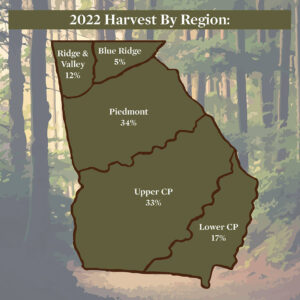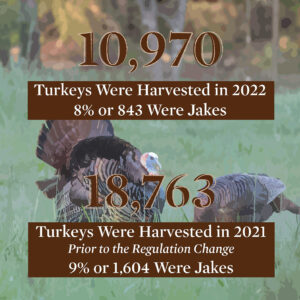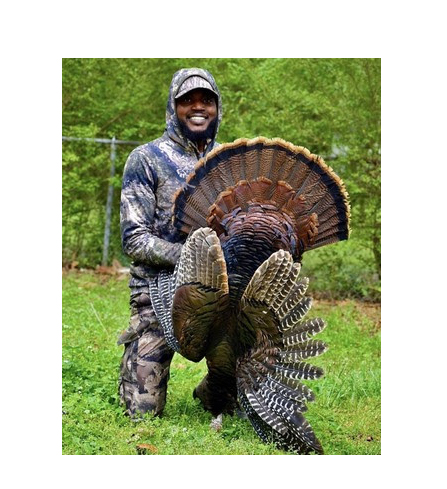
Let’s talk turkey. The Georgia turkey hunting season to be exact. The statewide turkey hunting season opens on private land on Saturday, April 1, 2023, and on public lands, including Wildlife Management Areas (WMAs) and National Forest land, on Saturday, April 8, 2022.
Turkey season ends statewide on May 15, 2023, according to the Georgia Department of Natural Resources’ Wildlife Resources Division.
“Statewide reproduction in 2021 was above the average we’ve seen in the last decade, which means we should have more two-year old birds in the woods,” explains Emily Rushton, Wildlife Resources Division wild turkey project coordinator. “While still lower than what we saw prior to the mid-1990’s, the average number of poults per hen was higher statewide than it has been since 2011, which is a good sign for this year’s turkey season.”
What can hunters expect across state regions this spring? All regions of the state had above average reproduction two years ago, but the Coastal Plain regions in the southern half of the state had the highest poult numbers, averaging over two poults per hen. Although the Blue Ridge, Ridge & Valley, and Piedmont regions had slightly lower poult numbers than South GA, the regions still had similar bumps in reproduction.
Hunters should remember that the daily and season bag limits changed last year and remains the same in 2023. Only one gobbler may be taken per hunter per day, and a season total of two gobblers. On WMAs and National Forest land (outside of WMAs), the bag limit is one gobbler per area.
All turkey hunters, including those under 16 years of age, landowners, honorary, lifetime, and sportsman license holders, must obtain a free harvest record each season. Before moving a harvested turkey, hunters are required to immediately enter the date and county on the harvest record, and within 24 hours, must complete the reporting process through Georgia Game Check. More information at GeorgiaWildlife.com/HarvestRecordGeorgiaGameCheck.
Resident youth hunters under age 16 will not need a license. Hunters age 16 years or older (including those accompanying youth or others) will need a hunting license and a big game license unless hunting on their own private land. Get your license at GoOutdoorsGeorgia.com, at a retail license vendor or by phone at 1-800-366-2661.
Hunters, did you know that each time you purchase a recreational license or equipment used to turkey hunt, such as shotguns, ammunition and others, that you are part of the greater conservation effort for wildlife in Georgia? Through the Wildlife Restoration Program, a portion of the money spent comes back to states and is put back into on-the-ground efforts such as habitat management and species research and management.
Stay Safe During Turkey Hunting Season
Before heading out to the woods for a turkey hunt, the Georgia Department of Natural Resources’ Wildlife Resources Division encourages all hunters to take time to review important turkey hunting safety tips.
“Talking about safety before you go hunting, and performing safety measures while hunting ensures that you, and those in the woods with you, will all get back home safely,” advises Jennifer Pittman, statewide hunter education administrator with the Wildlife Resources Division. “Safety measures while turkey hunting includes not only firearms safety practices but also observing precautions that are specific to turkey hunting.”
Turkey Hunting Safety Tips:
- Never wear red, white, blue or black clothing while turkey hunting. Red is the color most hunters look for when distinguishing a gobbler’s head from a hen’s blue-colored head, but at times it may appear white or blue. Male turkey feathers covering most of the body are black in appearance. Camouflage should be used to cover everything, including the hunter’s face, hands and firearm.
- Select a calling position that provides at least a shoulder-width background, such as the base of a tree. Be sure that at least a 180-degree range is visible.
- Do not stalk a gobbling turkey. Due to their keen eyesight and hearing, the chances of getting close are slim to none.
- When using a turkey call, the sound and motion may attract the interest of other hunters. Do not move, wave or make turkey-like sounds to alert another hunter to your presence. Instead, identify yourself in a loud voice.
- Be careful when carrying a harvested turkey from the woods. Do not allow the wings to hang loosely or the head to be displayed in such a way that another hunter may think it is a live bird. If possible, cover the turkey in a blaze orange garment or other material.
- Although not required, it is suggested that hunters wear blaze orange when moving between a vehicle and a hunting site. When moving between hunting sites, hunters should wear blaze orange on their upper bodies to facilitate their identification by other hunters.
Take Hunter Education Before Turkey Hunting: Available Online or in Person
Do you need hunter education before heading out in pursuit of a gobbler?
You have options! Hunters in need of the Georgia hunter education course can choose to go completely online or attend a classroom course, according to the Georgia Department of Natural Resources’ Wildlife Resources Division.
“Giving different course options allows the individual to decide which type of course is easier to manage and allows them to coordinate with their busy schedules,” says Jennifer Pittman, statewide hunter education administrator with the Wildlife Resources Division. “Thousands of people will complete their hunter education this year using these different options, so we are glad that we can offer this flexibility on how to receive the information and take this important course.”
The four available online courses each require a fee (from $19.95 – $29.00) but all are “pass or don’t pay” courses. Fees for these courses are charged by and collected by the independent course developer. The DNR classroom course is free of charge.
Completion of a hunter education course is required for any person born on or after January 1, 1961, who:
- purchases a season hunting license in Georgia.
- is at least 12 years old and hunts without adult supervision.
- hunts big game (deer, turkey, bear) on a wildlife management area.
The only exceptions include any person who:
- purchases a short-term hunting license, i.e. anything less than annual duration (as opposed to a season license).
- is hunting on his or her own land, or is a dependent hunting on land of his or her parents or legal guardians.
For more information, go to GeorgiaWildlife.com/hunting/huntereducation or call 706-557-3355.
For more hunting information, visit GeorgiaWildlife.com/hunting/hunter-resources.
2022 Turkey Season Stats
Click to enlarge
GaDNR


Chattooga Sports
Chattooga Kickoff Countdown: What to Expect This Football Season

Bulloch Public Safety
8/07/2025 Booking Report for Bulloch County

Bulloch Public Safety
8/06/2025 Booking Report for Bulloch County

Bulloch Public Safety
Sallie Zetterower Elementary School Employee Arrested After Cocaine Found at School

Bulloch Public Safety
8/05/2025 Booking Report for Bulloch County

Bulloch Public Safety
7/21/2025 Booking Report for Bulloch County

Bulloch Public Safety
7/14/2025 Booking Report for Bulloch County

Bulloch Public Safety
7/28/2025 Booking Report for Bulloch County

Bulloch Public Safety
7/18/2025 Booking Report for Bulloch County

Bulloch Public Safety
7/11/2025 Booking Report for Bulloch County




